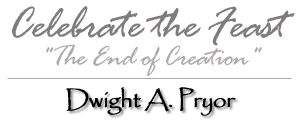
"You shall observe the Feast of Tabernacles seven days,
when you have gathered from your threshing floor and from your winepress.
"Seven days you shall . . . surely rejoice."
(Deuteronomy 16.13-15 NKJV)

Asking this question of ourselves can profoundly impact the way we live. It can reorient our priorities and fill us with a sense of divine purpose in an otherwise mundane life. It can enlarge our understanding of the great salvation we have in Messiah Jesus and transform the way we relate to our Father, the mighty Creator and gracious King of the Universe.
But who ever thinks like this? Who ever takes the time to reflect on such exalted subjects? So busy
are we coping with the urgent matters of day-to-day existence that seldom, if ever, do we stop to
reflect upon important cosmic questions. So focused are we laboring at our 'anthills' and building our
'barns' that we rarely stop to "look up!"
There are times we need to get outside our comfortable houses and common routines and lift up our heads
to contemplate the awesome wonders of God's creation. We must give thanks for all His abundant provisions, both material and spiritual. In other words, there are times we need to rejoice with Jesus in the Feast of Tabernacles!
The God of Israel set apart festal seasons or appointed times for His people to reflect upon the
important things of life and to respond appropriately. In the spring of the year we are reminded of
His great Redemption wrought in the Passover (Pesach). In the early summer, fifty days later, at
Pentecost (Shavu'ot) we are reminded of the great Revelation given by the Holy Spirit first at
Mt. Sinai and then on Mt. Zion. And then in the autumn of the year, we are enjoined to rejoice in
the goodness of the Creation by celebrating our Creator during the Feast of Tabernacles (Sukkot).
The three "pilgrim" festivals of Passover, Pentecost, and Tabernacles drew all the men of Israel,
including Jesus and His disciples, up to Jerusalem and the House of Adonai to celebrate. These
extraordinary convocations were far more, however, than celebrations of agricultural seasons
or commemorations of historical events in the life of Israel. They were seasons of intense
spiritual opportunity - reminding Israel of important truths about the character and conduct
of Yahweh, their God, and enhancing their relationship with Him.
Tabernacles is named after the sukkot (booths or tabernacles) in which families dwelt in their
sojourn from Egypt to the Land Promised to Abraham. The journey from slavery to the place of
promise and prosperity had to be made in sukkot - flimsy temporary shelters - with a radical
dependence upon God for direction, protection, and provision. One of the lessons we learn
from the Feast of Tabernacles is that our real security is found not in bricks and mortar
and the things made by our hands, nor in our stored up treasures. The Source and Supply for
our life and liberty is the Lord! All else, ultimately, is "vanity, vanity."
The book of Ecclesiastes is read during the week of Sukkot. The final harvest of the season
is secured; the barns and vats are full of grain, new wine and oil. At this very moment of
prosperity and plenty, the Lord reminds His people that He is the source of their goodness, and
that He, not Mammon, is to be their God.
Jewish families construct temporary shelters or sukkot in which to dwell during the seven days
of the festival. They take their meals and even sleep under the tabernacle of God's covering. They
get out of their normal routines and focus on the natural wonders of God's creation and the spiritual
calling of their journey of faith.
A tabernacle must be made of all natural elements and the roof thatched. Sitting under the sukkah,
one must be able to look up and see the starry sky, for this is the time to take a "telescopic" view
of life. To gaze upon the heavens, the handiwork that declares the glory of an awesome Creator, and
to rejoice in His goodness and greatness.
The goal or telos of the creation - the end for which the world was made - is to manifest God's Glory.
And His glory is never more magnified than when His creatures delight in Him. When we rejoice in
our Maker, He is exalted; when we worship the King with joy, fervency and focused attention, He is
enthroned in our praises. This is precisely the reason for celebrating the Feast of Tabernacles.
Scripture teaches that God has continuing obligations toward his covenantal people, Israel. At the end
of the age, when "His-story" comes to its final, glorious consummation, it will be to Jerusalem
that all the nations will ascend for the great Feast of Tabernacles (Zech. 14.16). On that
Great Day, the God of Abraham, Isaac, and Jacob will be King over the whole earth. "Yahweh will
be one, and His name the only name!" (Zech. 14.9)
This feast has abiding spiritual significance for us as well, in our pilgrimage of faith in Jesus. As
believers in Messiah, the "end of the age" already has broken in upon us in the redemption of
His blood, the reception of His spirit and the authority and power of His Kingdom. How fitting
then that we should celebrate the Feast of Tabernacles in His name. We rejoice because already we
have seen - and by faith believe that all the ends of the earth shall one day see - the salvation of
our God. (Isaiah 52.10).
It is for this reason that believers from across the nation and even foreign nations came to rejoice with Jesus in celebrating the Feast of Tabernacles.
©2000 All Rights Reserved